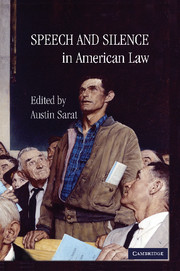Book contents
- Frontmatter
- Contents
- Contributors
- Acknowledgments
- Introduction: Situating Speech and Silence
- 1 “Our Word Is Our Bond”
- 2 Powell's Choice: The Law and Morality of Speech, Silence, and Resignation by High Government Officials
- 3 Anonymous: On Silence and the Public Sphere
- 4 Freedom of Expression, Political Fraud, and the Dilemma of Anonymity
- 5 Speech, Silence, the Body
- Comment on Chapter 5 Torture and Miranda
- Index
- References
Comment on Chapter 5 - Torture and Miranda
Published online by Cambridge University Press: 04 August 2010
- Frontmatter
- Contents
- Contributors
- Acknowledgments
- Introduction: Situating Speech and Silence
- 1 “Our Word Is Our Bond”
- 2 Powell's Choice: The Law and Morality of Speech, Silence, and Resignation by High Government Officials
- 3 Anonymous: On Silence and the Public Sphere
- 4 Freedom of Expression, Political Fraud, and the Dilemma of Anonymity
- 5 Speech, Silence, the Body
- Comment on Chapter 5 Torture and Miranda
- Index
- References
Summary
Peter Brooks's fine essay offers a fascinating juxtaposition. On the one hand, a terror detainee previously tortured to confess reiterates his confession at a hearing and asks for the death penalty and martyrdom. On the other, a woman interrogated by police without Miranda warnings repeats a confession after receiving the warning. In both cases, Brooks suggests, the second, “voluntary” confession should be suppressed.
What Brooks does not emphasize in his essay is that in the second case it was. The case is Missouri v. Seibert. The facts are straightforward: Patrice Siebert confessed during an unwarned custodial interrogation, was allowed a 20-minute coffee and cigarette break, received Miranda warnings and signed a waiver, then confessed again under directed questioning. This “two-step” strategy was deliberate. Brooks asserts that this technique “was – and with variants probably still is – taught in seminars and workshops for interrogators.” That's true only if those running the workshops haven't carefully read Seibert or are not interested in the results of interrogations being used in court.
In the trial, the post-warning statements were admitted and a jury convicted Seibert. The Missouri Supreme Court reversed. The United States Supreme Court affirmed that reversal: the conviction was overturned because the post-warning statements should have been suppressed. Justice Souter, in a plurality opinion joined by Justices Stevens, Ginsburg, and Breyer, held that “the facts here do not reasonably support a conclusion that the warnings given could have served their purpose.”
- Type
- Chapter
- Information
- Speech and Silence in American Law , pp. 214 - 221Publisher: Cambridge University PressPrint publication year: 2010



